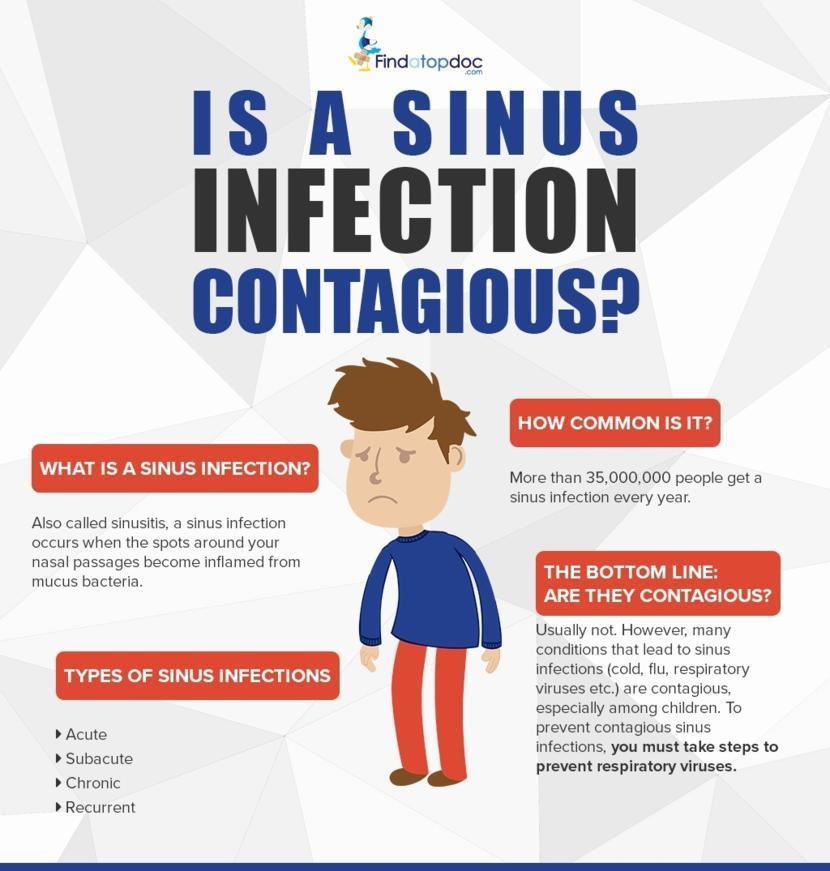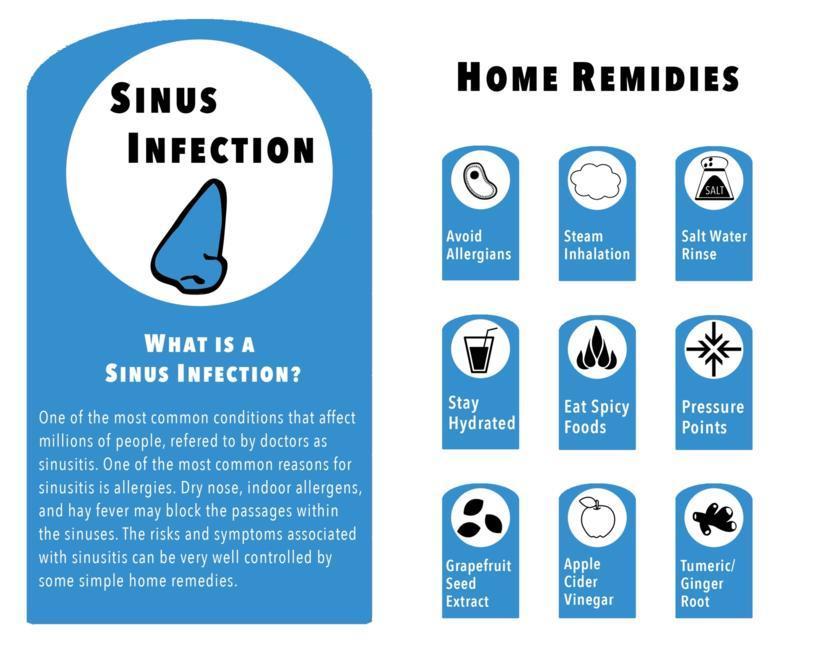Home Remedies for Sinus Infections

Sinus infections are one of the most common conditions that affect millions of people, and the issue may continue throughout their lives. Sinusitis, the infection of the sinuses, is known to affect nearly 37 million people in the U.S. There are people who try and test different varieties of medications to get some relief from this condition. Many end up with the wrong diagnosis and have treatments that are least likely to give any relief. Sinus problems may not need specific treatments or a doctor visit, as the solutions can be found in the house. The risks and symptoms associated with sinusitis can be very well controlled by some simple home remedies.
The first step towards treating sinus issues is to find the trigger for the problem. One of the most common reasons for sinusitis is allergies. Dry nose, indoor allergens, and hay fever may block the passages within the sinuses and this prevents the drainage of mucus from the sinuses to the nasal passages. As mucus is not cleared from the passages, it increases the risk of sinus problems.
What Could Cause a Sinus Infection?
Most people think a sinus infection is just a cold that went bad. However, there is more to it. About 37 million people in the US are affected every year with a sinus infection.
If someone were to see the whole problem on a superficial level then the cause looks simple to understand. The sinuses found in the nasal passages get clogged with mucus due to a cold infection which causes a sinus blockage. However, there is a lot more than just this. Why doesn't everyone’s cold and cough result in a sinus infection. Here are 13 causes that help in understanding what triggers a sinus infection in a person.
Viral infection attacking the body
In most cases the sinus infection is triggered due to a cold which is caused by a virus. The cold infection causes an inflamation in the nasal tissues which eventually causes a blockage due to which the mucus is not naturally drained leading to a sinus infection. When the sinus infection is triggered by a virus, antibiotics do not serve as an effective medium of treating the condition as antibiotics only work on killing the bacteria.
A viral infection usually subsides on its own after a duration of about a week or so. Decongestants normally help in breathing better however one must avoid getting dependent on the decongestants. Getting a flu shot regularly, practicing hygiene like washing hands regularly are the best ways to naturally prevent viruses fro0m casing the sinus infection.
Allergies from the environment
There are number of allergies which are often related to triggering the sinus infection in a person. In fact people who have allergies are most susceptible to acquiring the sinus infections. If you have allergies or symptoms of hay fever, then you should take care to avoid contact with the allergens like dust, pollen, pollution and small bugs who often trigger allergic reactions in people.
There are a number of prescription or OTC antihistamine drugs that help in dealing with the allergy better and reducing the inflammation that causes the sinus infection around the nasal passage.
Bacteria
Normally a cold infection starts from a virus and then often a bacteria joins hands to make it worse. So, if you have a cold which is lasting for a good 10-15 days then there are chances you could also have a bacteria aggravating your symptoms.
Bacterial infections do not directly trigger a sinus infection but cause other secondary infections which could result in sinus. We all have bacteria living in our body in a dormant form, waiting to grow when it is the right time. Bacterial infections normally require treatment which includes administering antibiotics.
Polyps
Small growths that occur in the nasal passage or sinus tissues are called nasal polyps. These growths often cause the sinus cavities to get clogged, eventually causing the mucus to get clogged in the passage resulting in a sinus infection.
These germs also cause a hindrance in free movement of air across the nasal passage which further results in headaches that are common in sinus infections. People suffering from nasal polyps also have a reduced smelling sensation.
Polyps require treatments using steroids or nasal spray steroids. If the steroid treatment doesn't work, then a surgery may be recommended.
Irritating pollutants
There are a number of allergens and dust pollutants that are found freely in the air like dust or certain strong smells. This could often cause cough or irritation in the nose and also cause swelling in the sinus passages.
These irritants must be avoided as far as possible to reduce the occurrence of sinus infections especially if you have other conditions like asthma or allergy. Using an air purifier could also help in purifying the air and keeping it free from the allergens.
Swimming
Swimming long hours in chlorinated water could result in sinus infection for those who are already prone to it. Chlorine can cause irritation in the nasal passage and the sinus cavities.
Flying
Whether it is for work or a vacation, flying could often cause aggravated sinusitis symptoms. When there is air pressure built up during the flying time, a certain pressure builds up in the head which often results in blockage of the sinuses and the nasal air passage that could just result in worsening of your cold symptoms.
This usually happens during landing or takeoff. An easy solution to prevent this is by using nasal drops or inhalers that help in clearing up on your sinuses.
Fungi
Just like bacteria and viruses, fungi could also result in sinus infections which mostly impacts people with poor immunity levels. Due to certain medical conditions you could have a reduced immune system which favors the growth of fungi in the body.
Fungi need a warm, dark and moist environment to grow, and sinus cavities work very well for this growth.
Overusing Nasal sprays and products
Although nasal decongestant sprays help in relieving nasal blockages helping one breathe better, a prolonged use can often cause an addiction to these products. Sometimes these products could block the blood flow in the nasal region causing worsening of symptoms like nose congestion.
Prolonged use of the nasal drops and sprays often makes the body immune to the desired effect and hence they may stop working for you over a period of time. If your symptoms persist, see a doctor or try safe and natural remedies like steaming to get relief from your nasal congestion.
Smoking
Just like any other pollutant such as dust, cigarette or cigar smoking could also irritate the lining of your nose causing it to swell up. It hence becomes more prone to the sinus infection. Chain smokers as well as secondary smokers become naturally susceptible to the risk of sinus infections as the smoke tends to impact and affect their breathing sensation and airways.
Simple tips to help reduce the risk for sinus problems include the following:
Sinus can be treated very well through medications and alternative remedies that can be practiced at home using some simple techniques. Even applying a cloth pad that is heated on to the face can provide instant relief to the blocked sinus cavities. The objective of any treatment for the sinus involves the following:
- Improving draining of the mucus from the nasal passage and thereby reducing the inflammation of the sinus cavities.
- Get relief from the pain
- Help in eradicating the infections which could be the root cause of the sinus infection.
- Preventing any scarring that can damage the sinus tissues or the lining of the nose.
- When the room temperature is too high, it may result in dry membranes. The ideal temperature varies depending on the individual. It would be better to keep it cool rather than too warm. The warning signs of dry air are nose bleeds and congestion while getting up in the morning. So keep the temperature down and keep the room cool.
- Humidifying the air when it is too dry is ideal for preventing the triggers for sinus issues. Yet, one should be careful to not over humidify an environment, as it may lead to the growth of mold, which is yet another trigger for allergies and sinus problems. Vaporizers may also be of help in dry environments to keep sinus issues from flaring up. Inhaling steam two to three times a day helps to reduce the symptoms.
- Having stale air inside the house may increase the risk for sinusitis. Remove the stale air by keeping the doors and windows open on a warm day. Remember to clean the air ducts of the heating and cooling systems as well. This will clear the air of dust and mold, if present.
- Drinking plenty of liquids, particularly plain water, improves the functioning of the sinuses. Experts believe that one should drink enough water so that the urine is clear. Nasal rinses and Neti pots are used by many to reduce the symptoms.
- In many cases the trigger for sinus problems are cigarette smoke, or fumes from cleaning products. It would be ideal to avoid anything with very strong fumes. Pet dander may also make symptoms worsen in the case of sinus issues. Keeping the pet clean and reducing one's exposure to pets may be useful to reduce the risk for sinus issues.















